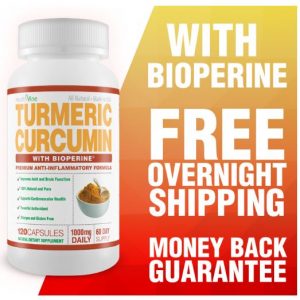Though turmeric powder has been used in Eastern culinary techniques for centuries, it isn’t all that well known in the West. A member of the ginger family, the turmeric plant is native to the warm, humid forests of Southern Asia. In India and Thailand especially, its culinary value is ubiquitously recognized. Its widest use in these areas is as a principal ingredient of curry.
Additionally, turmeric is incorporated into many other dishes as well – even a few sweeter ones. It’s a safe bet to assume that just about every Eastern food one might come across with a deep yellow hue contains at least some turmeric. Even the popular western condiment mustard owes its hue to the presence of turmeric.
Aside from its interesting color, turmeric has a few other, more important valuable qualities. Turmeric’s chemical makeup gives it a powerful combination of health benefits. These positive consequences of turmeric consumption are wide ranging and surprisingly effective. Read on as we detail the specific health advantages one receives when turmeric is incorporated into their diet.
Turmeric and Brain Health
 One devastating affliction that has garnered a lot of attention in recent years is the degenerative brain condition Alzheimer’s Disease. Those familiar with it know that it is an absolutely tragic for both the victim and their loved ones, as total memory loss, complete confusion, and eventual passing are Alzheimer’s ultimate effects. Unfortunately, there is no known cure for Alzheimer’s Disease – so the focus is placed on prevention.
One devastating affliction that has garnered a lot of attention in recent years is the degenerative brain condition Alzheimer’s Disease. Those familiar with it know that it is an absolutely tragic for both the victim and their loved ones, as total memory loss, complete confusion, and eventual passing are Alzheimer’s ultimate effects. Unfortunately, there is no known cure for Alzheimer’s Disease – so the focus is placed on prevention.
Recent medical studies have shown that turmeric may be a useful tool in the prevention of degenerative brain conditions like Alzheimer’s. Though the causes of the disease haven’t yet been pinpointed, Alzheimer’s is believed to be at least accelerated by a buildup of amyloyd plaque in the brain. Test tube studies performed by UCLA researchers showed that curcumin, the active biological ingredient in turmeric, prevented the accumulation of amyloyd particles.
With most other foods, this would be interesting but not particularly useful, because food ingredients don’t generally cross what’s called the “blood brain barrier” to have any effect. Curcumin, however, does. It can therefore stop the buildup of amyloyd in the place where it happens. It should be noted that there is nothing out there shown to reverse the progress of Alzheimer’s disease. But, as these preliminary test tube studies demonstrated, turmeric can help in both its prevention, and perhaps even slowing down its progress in some patients.
Turmeric and Heart Health
In addition to safeguarding the brain, some medical tests seem to indicate that turmeric is good for the heart as well. Again, curcumin is the ingredient believed to be responsible for this. When curcumin enters the body, some of its molecules communicate with the liver, activating the process that creates LDL (or bad cholesterol) receptors. These receptors then make their way into the bloodstream, where they pick up and clear out LDL molecules that could otherwise accumulate in veins and arteries. In lab tests, liver cells exposed to curcumin were initiating the process of making these LDL receptors at 7 times the levels of untreated liver cells.
Turmeric’s Effects on Cancer
While many foods and food additives are heralded for their cancer prevention qualities, turmeric is one of the few that may actually help to slow the spread of cancer for those who already have it. The effect has been demonstrated most prominently with breast cancer. In a study performed in 2005, mice were injected with breast cancer cells and separated into several different groups.
The first received no treatment, the second received a cancer-fighting pharmaceutical drug only, the third received turmeric only, and the fourth was given both the cancer drug and turmeric. Over the span of a few weeks, the cancer had spread (or metastasized) in 95% of the mice that received no treatment at all. Of those who were given turmeric and the cancer drug, on the other hand only 22% had their cancers spread. According to the researchers, the combination worked so well because curcumin is a sort of “switch” that turns off biological processes necessary for tumors to form and grow.
Prostate cancer, as well, seems to be affected by the consumption of turmeric along with cauliflower. In a study similar to the one performed for breast cancer, mice were injected this time with prostate cancer cells. The combination of turmeric’s active ingredient curcumin and a molecule in cauliflower called isothiocyanate was shown to greatly reduce the growth and spread of prostate cancer cells in those mice.
Turmeric as an Anti-Inflammatory Agent
Curcumin, it seems, is one of those wonder molecules that can do just about anything in the human body. Aside from lowering cholesterol, clearing out plaque, and fighting tumor growth, it is also has quite powerful anti-inflammation properties. In fact, the effect is so impressive that curcumin is believed to be nearly as effective in pain relief as over-the-counter anti-inflammatory medications such as Motrin and Tylenol. The difference, of course, is that while turmeric is safe in large doses, these over-the-counter drugs are certainly not.
 The implications of turmeric’s anti-inflammatory properties are numerous. In addition to normal pain relief, turmeric could also be a significant help for those suffering from Rheumatoid Arthritis. This condition, which causes joint inflammation and damage in those affected, seems to respond well to the consumption of turmeric. In anecdotal reports, arthritis sufferers experienced significant pain relief and a reduction in joint swelling when they consumed turmeric powder on a regular basis.
The implications of turmeric’s anti-inflammatory properties are numerous. In addition to normal pain relief, turmeric could also be a significant help for those suffering from Rheumatoid Arthritis. This condition, which causes joint inflammation and damage in those affected, seems to respond well to the consumption of turmeric. In anecdotal reports, arthritis sufferers experienced significant pain relief and a reduction in joint swelling when they consumed turmeric powder on a regular basis.
While curry may not be the most popular or well-established food item in the West, there is clearly quite a few benefits to be attained from giving it a try. When prepared well, turmeric can be a flavorful addition to foods that would normally be seasoned with sodium heavy additives. So, instead of contributing to high blood pressure with that salt shaker, try your hand at making curry to add a little punch to your next serving of vegetables. The health benefits are certainly worth it, and its pleasant taste might just surprise you.




